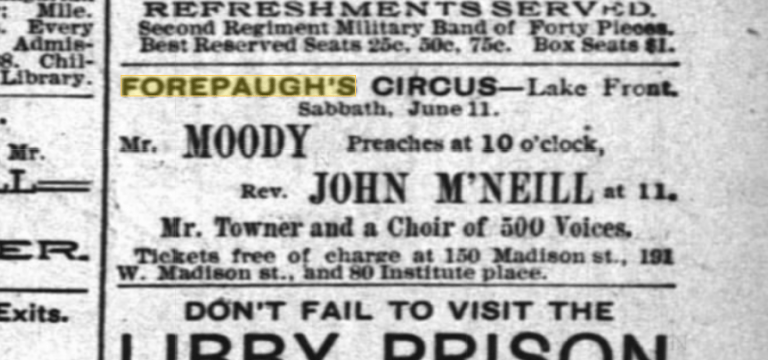Billy Sunday’s first professional baseball game was played May 22, 1883, in Chicago at now-Millennium Park. Ten years later, on June 11, 1893, D.L. Moody would preach in a circus tent to his largest audience at the same spot!
The 1890s were the peak of the Gilded Age. Industrialization, wage growth, railroads, factories, mines, immigration, formed the boom times that were not seen again until the 1920s. Today visitors throng to Chautauqua or the Grand Hotel at Mackinac Island to relive the era.

Image Credit: “10 Things You Might Not Know About Mackinac Island’s Grand Hotel.” Pure Michigan | Official Travel & Tourism Website for Michigan, 3 Sept. 2024, www.michigan.org/article/trip-idea/things-might-not-know-mackinac-island-grand-hotel.
America wanted to celebrate – and the occasion was the 400th anniversary of Christopher Columbus’ discovery of America. A Columbian Exposition was planned, and the U.S. House of Representatives voted eight times until it could settle upon Chicago. From May 1 to October 30, the year of 1893 would see the Columbian Exposition in Chicago.

Image Credit: C. D. Arnold (1844-1927); H. D. Higinbotham, Public domain, via Wikimedia Commons
The event would be so big, that it is still commemorated today as the third of the four stars on the Chicago flag.
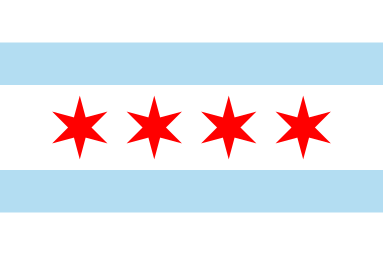
Image Credit: cs:User:-xfi-, Public domain, via Wikimedia Commons
The leading travelling entertainment of that day was the circus. Alas the leading circus pioneers, P.T. Barnum and Adam Forepaugh, would not live to see the Columbian Exposition, but the show would go on.
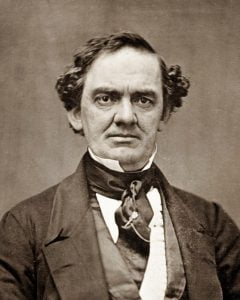
P.T. Barnum (Image Credit: unattributed, Public domain, via Wikimedia Commons)

Adam Forepaugh (Image Credit: Photographer Unknown. Photo dated from 1860-1890. Digital collection of the Billy Rose Theatre Division, New York Public Library., Public domain, via Wikimedia Commons)
Or would it? Barnum’s company owned the Forepaugh circus – and was going to bypass Chicago in 1893. How could a mere circus compete with an entire city arising from a swampy park?
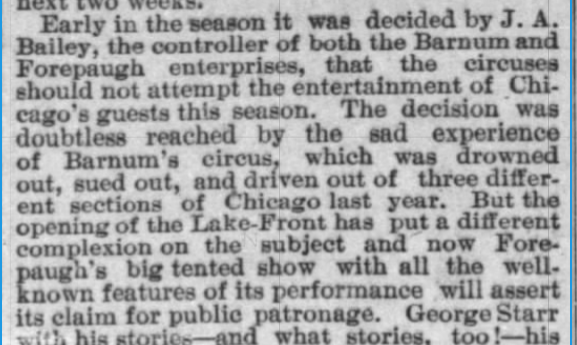
Image Credit: Jun 04, 1893, Page 26 – Chicago Tribune at Newspapers.com. www.newspapers.com/image/349853024/?match=1&terms=%22J.%20A.%20Bailey%22.
Yes, the Circus would come to Chicago, partially because they had a fight they would not give up – for the Lake-Front was a controversial area. In 1803 it was in the surrounding area of Fort Dearborn, named for the Secretary of War who commissioned the fort.
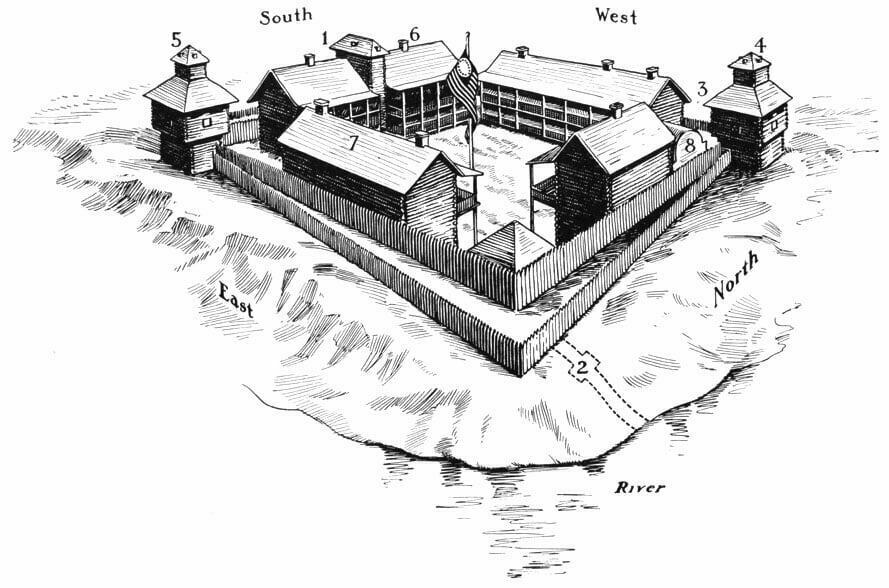
Image Credit: J Seymour Currey, Public domain, via Wikimedia Commons
Fort Dearborn is located at today’s intersection of Michigan and Wabash – and is a beautiful spot (see author’s photograph below)
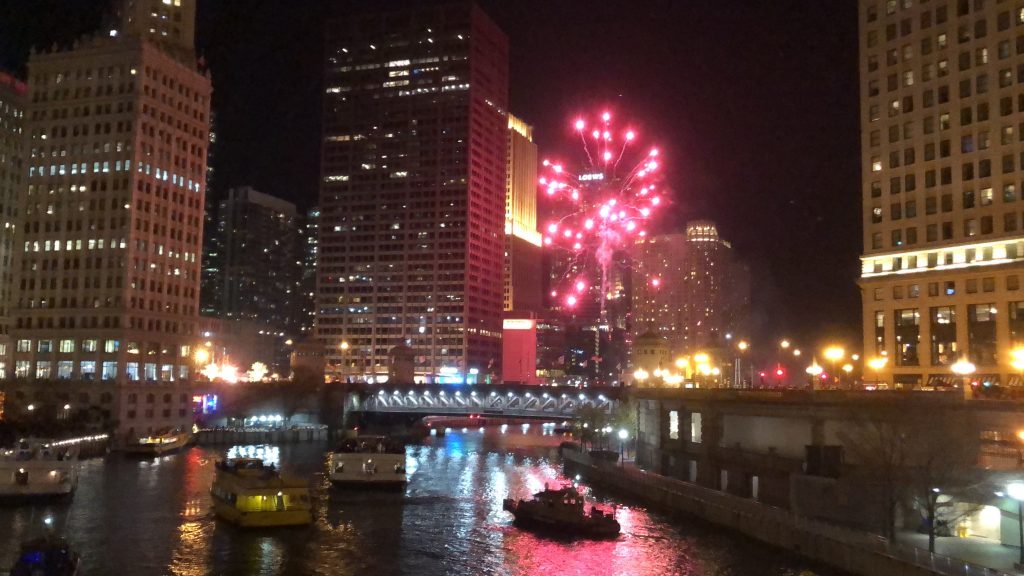
Modern Fort Dearborn
In 1837, the Fort was no longer needed (it was a battle site in the War of 1812), but it was deeded to the City of Chicago.
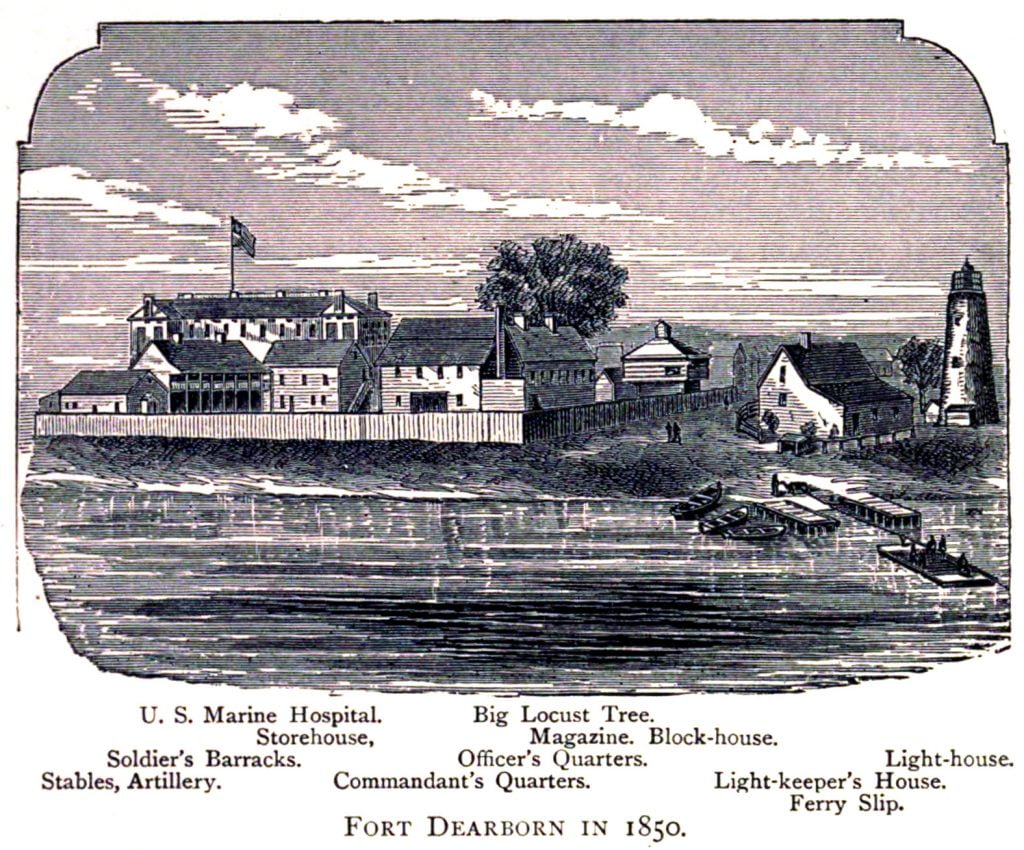
Image Credit: daguerrotype by Polycarpus von Schneidau, Public domain, via Wikimedia Commons
As part of the terms, part of the outlying area was restricted. Joseph Kearney, Dean of Marquette Law School published a law review article in the Northwestern University Law Review that investigated this issue and notes the original paperwork said “The public ground between Randolph and Madison streets, and fronting upon Lake Michigan, is not to be occupied with buildings of any description.” Unfortunately, “The original recorded copy of this map burned in the Chicago Fire of 1871, and the map was not rerecorded after the fire.” At this time the lake was much closer to Michigan Avenue than it is now, and Michigan Avenue luxury home owners were afraid they may suffer erosion into the lake as well! By 1865 most of this land was a lagoon – with the Illinois Central building a bridge over the water.
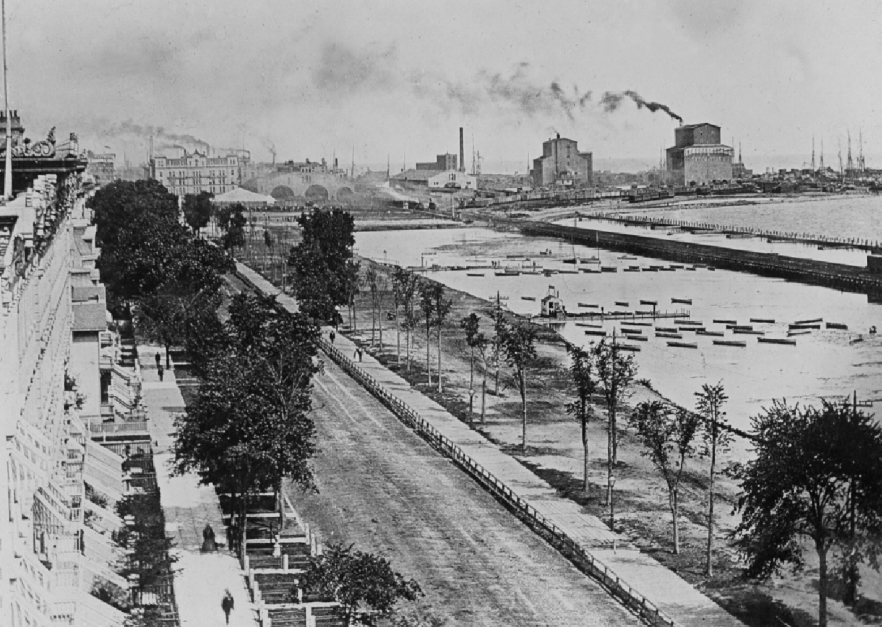
Image Credit: Larson, Jerry. “3.6. HOW THE FIRE CHANGED CHICAGO’S URBAN STRUCTURE.” The Architecture Professor, 17 Sept. 2021, thearchitectureprofessor.com/2020/05/18/3-6-how-the-fire-changed-chicagos-urban-structure.
In 1869, the state legislature tried to work a deal with the Illinois Central to fill the lagoon and develop the area. That wouldn’t happen, but some of the land would find a use.
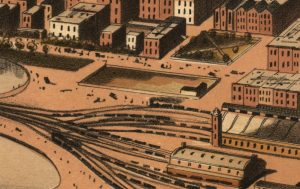
Image Credit: W. Flint, Public domain, via Wikimedia Commons
In 1871 the northwest corner of now-Millennium Park was the new Union Base-Ball Grounds that would host the Chicago White Sockings (now the Cubs)! Alas, 1871 would also be the year of the Great Chicago Fire.
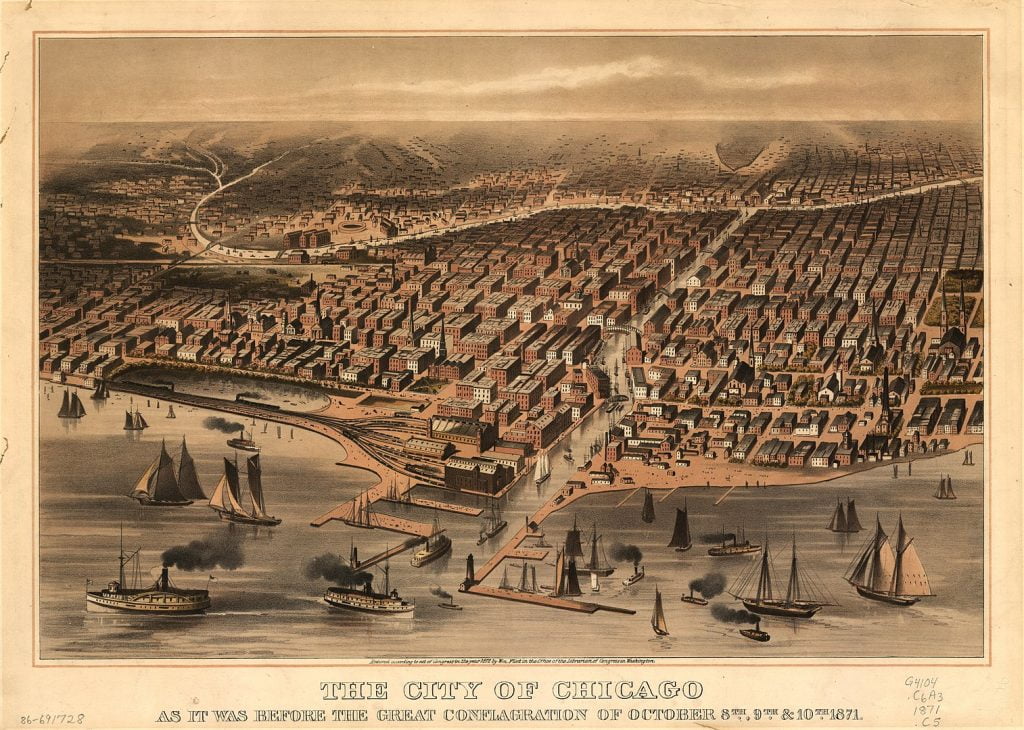
Image Credit: Library of Congress, Public domain, via Wikimedia Commons
The Great Fire left much debris and wiped out the houses along Michigan Avenue and the baseball field. The rubble from the city would fill the lagoon and extend the shoreline.
As the city rebuilt, a new baseball stadium would be erected and the Chicago White Stockings would begin to play there again in 1878.
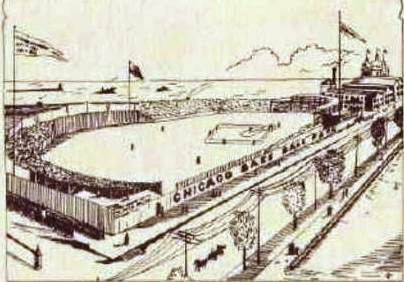
Image Credit: “Chicago’s Lakefront Park 1878–The First Game.” Baseball History Daily, 20 Mar. 2015, baseballhistorydaily.com/2013/05/23/chicagos-lakefront-park-1878-the-first-game.
They would expand their stadium after 1882 in time for the 1883 season, at a stadium “considered the finest in the majors”.
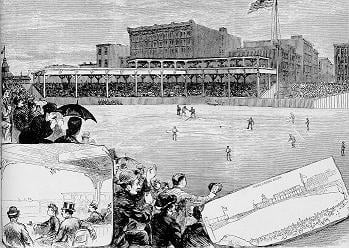
Image Credit: 1883 Harper’s Weekly illustration, Public domain, via Wikimedia Commons
By the way, who would be joining the Chicago White Stockings as a rookie for the first year at the expanded ballpark in 1883?
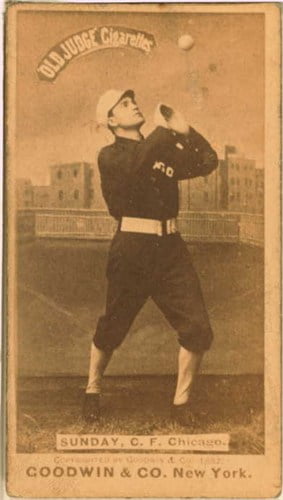
Billy Sunday (Image Credit: Limited, Alamy. “Billy Sunday, Chicago White Stockings, Baseball Card Portrait, Circa 1888.” Alamy Images, www.alamy.com/stock-photo-billy-sunday-chicago-white-stockings-baseball-card-portrait-circa-79203232.html.)
After just two seasons, the ballpark would be no more as a result of United States v. Chi. Base Ball Club, No. 19026 (C.C.N.D. Ill. May
27, 1884).
By 1890, Aaron Montgomery Ward would be fighting to keep the Lake Front Park (now Millennium Park) free of buildings for the use of the employees of his mail-order catalog business that was positioned on Michigan Ave.
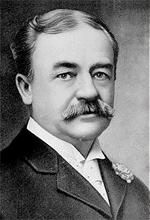
Aaron Montgomery Ward (Image Credit: Unknown source, Public domain, via Wikimedia Commons)
Montgomery Ward did not want anything coming into his area, buildings or even a circus! In April 1893 he filed suit against the Forepaugh Show, and in May 1893 the judge ordered Forepaugh not to build. Michael Daly claims “Bailey [manager of the Forepaugh Circus] very well might have dropped Chicago from his itinerary had others not tried to force him to do so.” As a result Bailey dug in and fought and was able to open in June for two weeks. Competing with the Columbian Exposition, the Forepaugh Circus went patriotic and returned to 1776 for re-enactments of battles from the American Revolution!
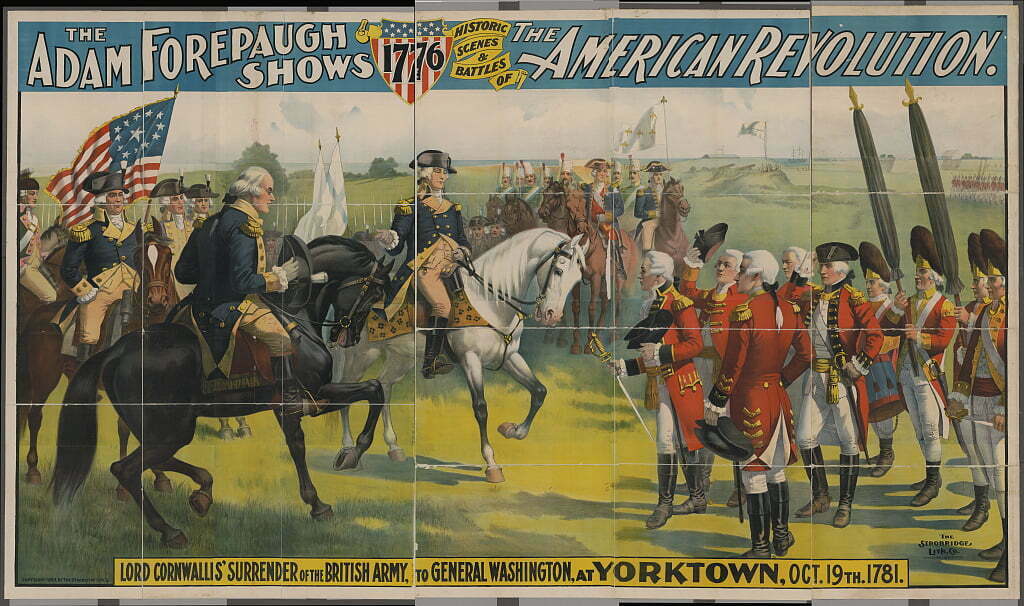
The Adam Forepaugh shows. 1776 Historic scenes and battles of the American Revolution. Lord Cornwallis’ surrender of the British Army to General Washington, at Yorktown, Oct. 19th, 1781. Poster (chromolithograph), published by Strobridge Litho. Co., 1893. http://hdl.loc.gov/loc.pnp/ppmsca.55227
The Chicago Tribune reported “It illustrates in a series of scenes and action the principal events in the struggle of the forefathers for independence. It is promised to be wonderfully realistic in all its details. It will include 1,000 men, women, and children correctly costumed and armed.” But it was still competing against the Columbian Exposition:
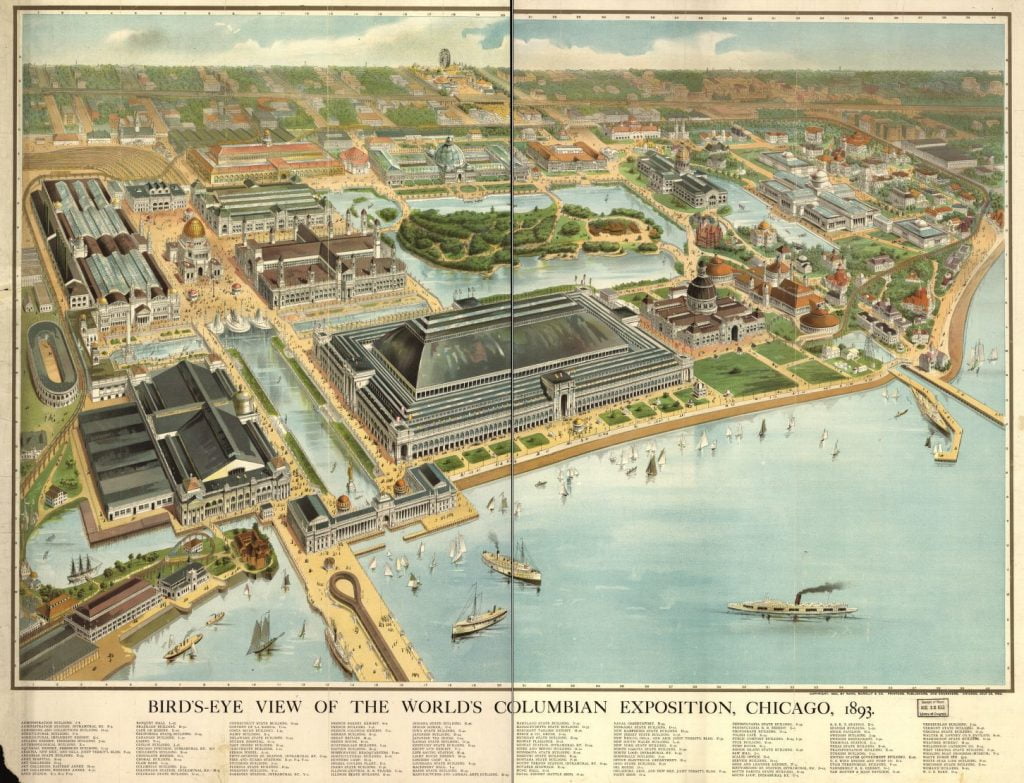
Image Credit: Library of Congress, Public domain, via Wikimedia Commons
And that didn’t count the Midway!
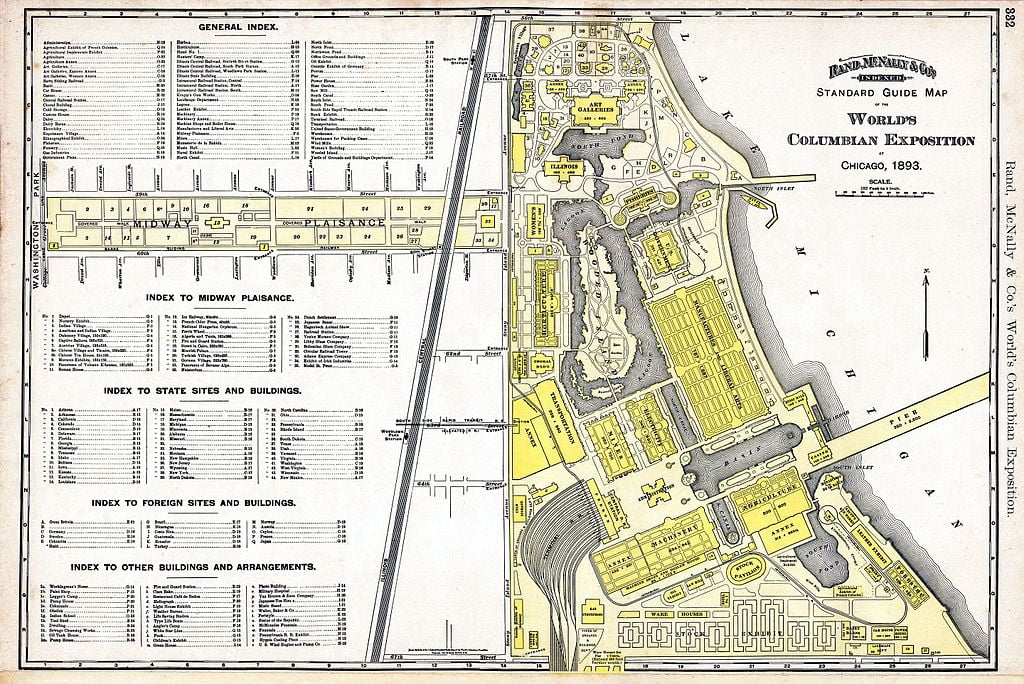
Image Credit: Rand, McNally & Co., Public domain, via Wikimedia Commons
The Forepaugh Circus would be at the site of present Millennium Park.
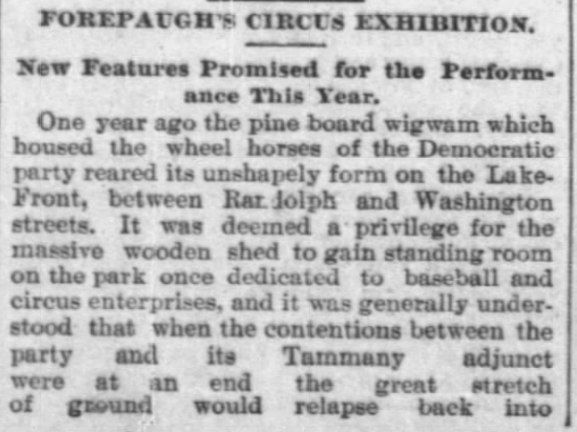
Image Credit: Jun 04, 1893, Page 26 – Chicago Tribune at Newspapers.com. www.newspapers.com/image/349853024/?match=1&terms=%22pine%20board%20wigwam%22.
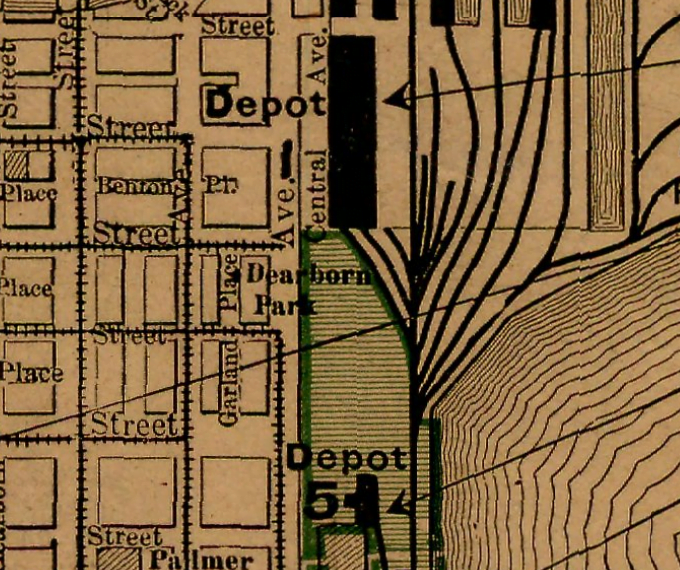
Image Credit: “Pt. 2: 1892-1893-First Karpen Building – the History Of S. Karpen &Amp; Bros.” The History of S. Karpen & Bros., 27 Dec. 2022, skarpenfurniture.com/pt-2-1892-1893.
On June 4th the Forepaugh Circus arrived in Chicago:
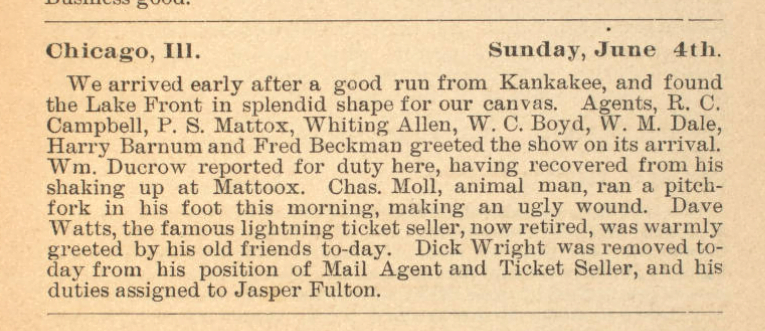
Image Credit: Official Route Book of the Adam Forepaugh Shows: Presenting a Complete Chronicle of Interesting Events and Happenings, and Valuable Data, for the Season of 1893. – Circus Route Books -. digital.library.illinoisstate.edu/digital/collection/p15990coll5/id/1341.
Business wasn’t doing too well on Thursday:

Image Credit: Official Route Book of the Adam Forepaugh Shows: Presenting a Complete Chronicle of Interesting Events and Happenings, and Valuable Data, for the Season of 1893. – Circus Route Books -. digital.library.illinoisstate.edu/digital/collection/p15990coll5/id/1342.
And that same day this ran in the Chicago Tribune:
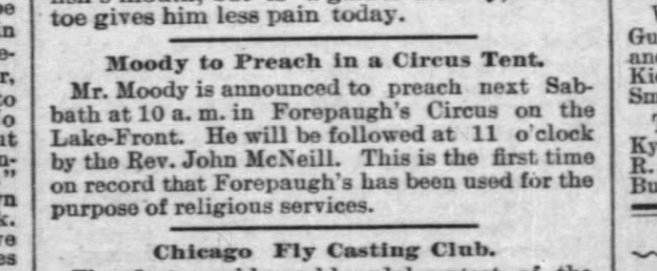
Image Credit: Jun 08, 1893, Page 11 – Chicago Tribune at Newspapers.com. www.newspapers.com/image/349854085/?match=1&terms=%22moody%20to%20preach%22.
Ads would run in the Chicago Tribune and the Interocean
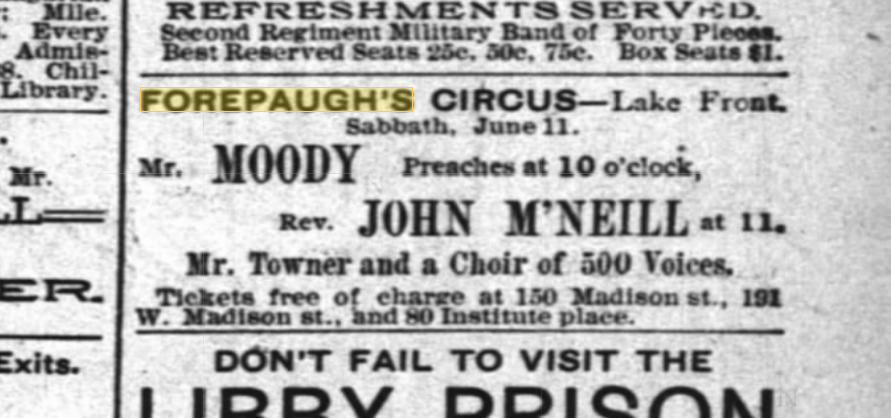
Image Credit: Jun 08, 1893, Page 6 – Chicago Tribune at Newspapers.com. www.newspapers.com/image/349854010/?match=1&terms=%22mr.%20towner%20and%20a%20choir%22.
Newspapers in other states were impressed!
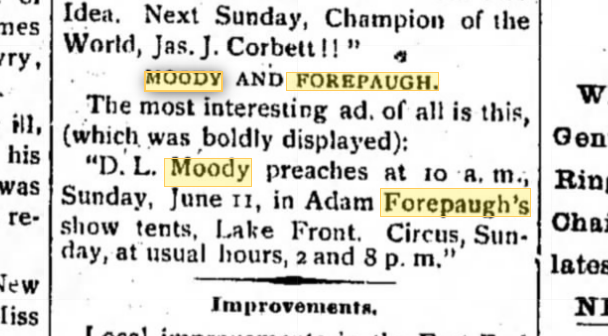
Image Credit: Jun 15, 1893, Page 5 – The Record-Argus at Newspapers.com. www.newspapers.com/image/15061243/?match=1&terms=%22moody%20and%20forepaugh%22.
And even the Adam Forepaugh show would notice the special event

Image Credit: Jun 10, 1893, Page 4 – Chicago Tribune at Newspapers.com. www.newspapers.com/image/349854345/?match=1&terms=%22the%20adam%20forepaugh%20shows%22.
Moody & McNeill weren’t taking it easy – they had a full Sunday
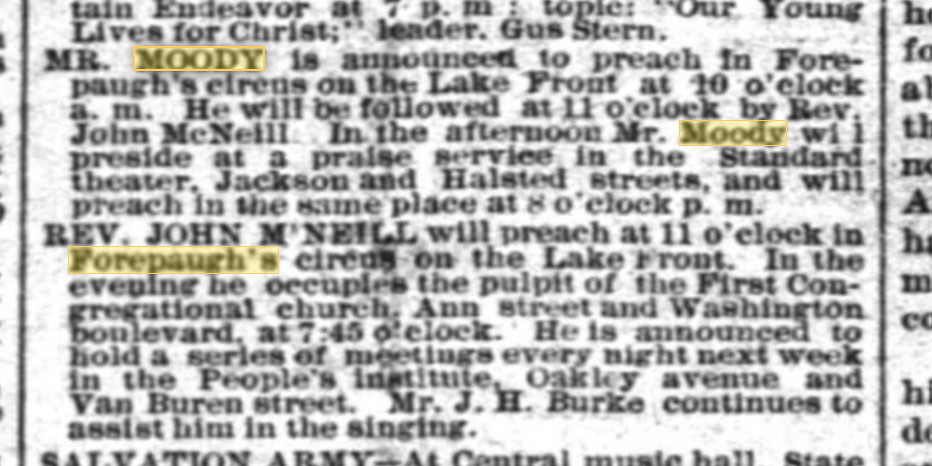
Image Credit: Jun 11, 1893, Page 31 – The Inter Ocean at Newspapers.com. www.newspapers.com/image/33837740/?match=1&terms=%22rev.%20john%20m%27neill%20will%20preach%22.
The meeting was successful and featured in the Daily Tribune on the front page, first column!
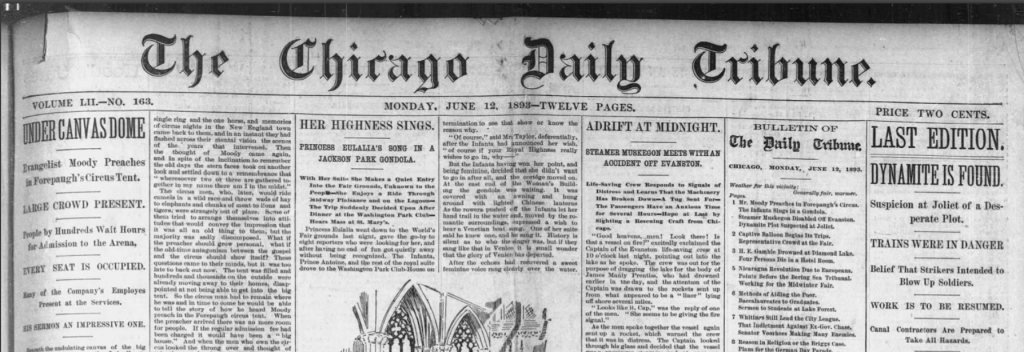
Image Credit: Jun 12, 1893, Page 12 – Chicago Tribune at Newspapers.com. www.newspapers.com/image/349855184.

Image Credit: Jun 12, 1893, Page 12 – Chicago Tribune at Newspapers.com. www.newspapers.com/image/349855184.
Here’s the article:
Beneath the undulating canvas of the big Forepaugh circus tent on the Lake-Front, Evangelist Dwight L. Moody stood yesterday morning and to the multitude of people gathered about him he told the old, old story. It was a novel situation both for the preacher and the congregation. In every direction were the implements of the circus and its rattle and dash and excitement. From the menagerie tent adjoining came occasionally the rumbling sound of a lion’s suppressed roar mingled with the trumpeting of an elephant or the sharp bark of a hyena.
Behind the vast concourse of listening humanity were housed the horses, those trained to tricks and unused, as also were the other and wilder animals, to music not produced by a brass band. “Nearer, My God, To Thee,” sung by thousands of earnest voices, was new to the captive creatures. And perhaps it was the novelty that in a measure subdued the roars and shrieks and barks that seem at other times never to be entirely absent from inside those canvas walls.
Strange scenes were enacted about the circus tents during the early morning hours. The men who swing big hammers were quiet and orderly. They were clean-shaved and bright-looking. In groups they gathered and tried to remember if they had ever before heard of a preacher holding his meeting in such a place. They failed to do so, and then they wandered up against the big posters which announced that “D. L. Moody will preach here Sunday morning.” They glanced from these to the gaudy signs which told of the marvelous attractions to be seen when the circus is at work. The men who swing the hammers were soon joined by the hoarse-voiced young fellows who sell lemonade. Close behind these, all freshly shaved and decked in showy circus clothes, were the chaps who dispense peanuts. With them all were the active youngsters who leap from tier to tier of seats following the man who announces that there is to be a concert and making sales of seats for the “other half” of the show…..
Visitors would record it as a highlight of their trip
[We] were present at a service in a large circus tent in which there were 15000 people addressed by Mr Moody, Mr McNeil and others. At another time, in a crowded theatre where Moody was preaching, I pushed through the throng to speak to and shake the hand of the great evangelist. We also heard Dr Gunsaulus, a polished and able preacher of the Congregational Church, and Dr Henson, the clever pastor of the First Baptist Church. We visited most of the places of interest in and about Chicago, and left there on the 18th June, on our way to New York, via Niagara Falls. (Hickson J, Notes of Travel p.19)
And especially in the notes of the Circus…
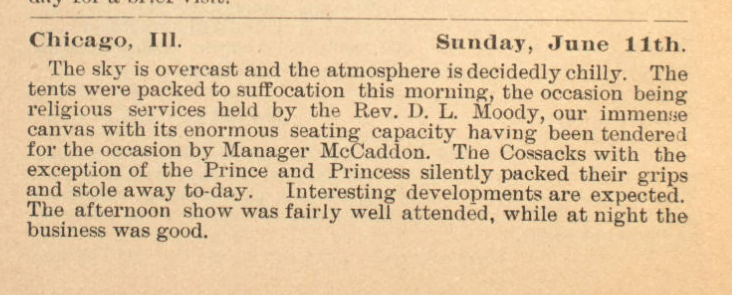
Image Credit: Official Route Book of the Adam Forepaugh Shows: Presenting a Complete Chronicle of Interesting Events and Happenings, and Valuable Data, for the Season of 1893. – Circus Route Books -. digital.library.illinoisstate.edu/digital/collection/p15990coll5/id/1342.
And the meetings would be continued again!

Image Credit: Jun 16, 1893, Page 12 – Chicago Tribune at Newspapers.com. www.newspapers.com/image/349856202/?match=1&terms=%22revivalists%20continue%20their%20work%22.
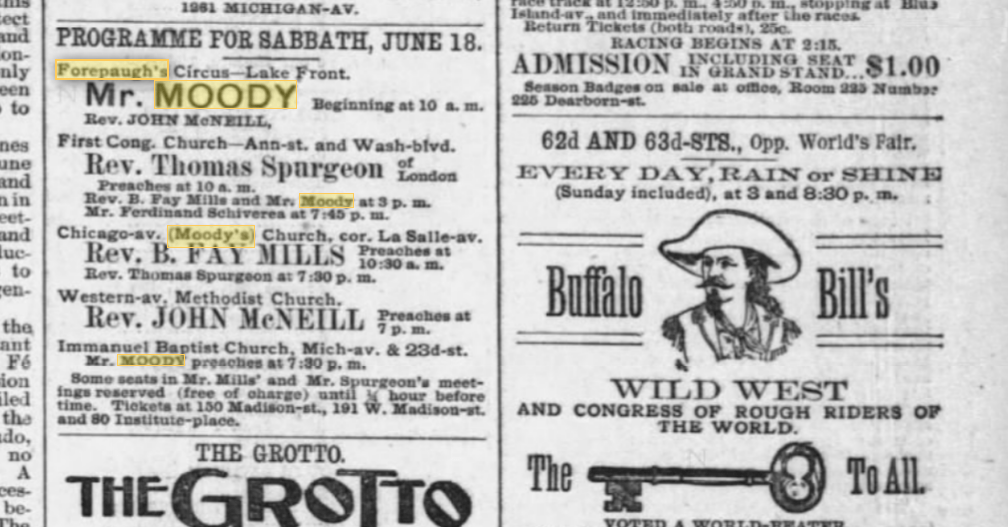
Image Credit: Jun 16, 1893, Page 13 – Chicago Tribune at Newspapers.com. www.newspapers.com/image/349856218/?match=1&terms=%22programme%20for%20sabbath%22.
The next week the ads would run right next to the entertainment ads for Buffalo Bill’s Wild West
And the Circus itself would note their experience wasn’t great, but Moody could still pack a house!
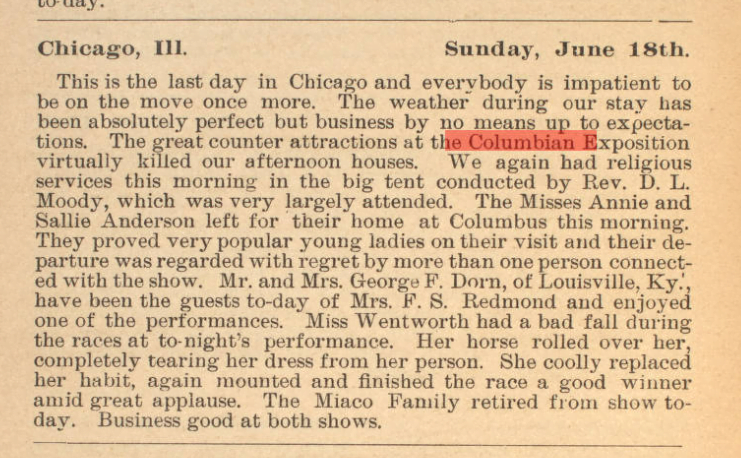
Image Credit: Official Route Book of the Adam Forepaugh Shows: Presenting a Complete Chronicle of Interesting Events and Happenings, and Valuable Data, for the Season of 1893. – Circus Route Books -. digital.library.illinoisstate.edu/digital/collection/p15990coll5/id/1344.
What did Moody and friends have to say? From the book Moody in Chicago
IN CIRCUS AND HALL.
AMONG the most notable of the large meetings held during the early part of the campaign were those in the mammoth Forepaugh’s Circus tent and in Tattersalps huge barracks-like hall, on the south side. In the former place two meetings were held, on two successive Sundays in June. The circus tent covered an immense area, with 10,000 seats and an arena capable of accommodating 10,000 more. In the center of the arena a rude platform was erected for the speakers and a few of the singers, while the rest of the song corps were massed around them.
An observer describes the scene in few words as follows: “The surroundings were the usual circus furniture ropes, trapezes, gaudy decorations, etc., while in an adjoining canvas building was a large menagerie, including eleven elephants. Clowns, grooms, circus riders, men, women, and children, drinking and betting men, pickpockets, all gathered, we were informed, into this unique assembly. What a crowd it was ! Men, women, and children, 18,000 of them, and on a Sunday morning, too!
Whether the gospel was ever before preached under such circumstances I know not, but it was wonderful, to ear and eye alike. The sight of the vast sea of faces was at once glad and solemn. By half-past nine the choir took their places in front of an audience already vast in extent, although tickets were available for half an hour, yet before that entrance was free to all comers. Be it understood, however, that tickets were not in use to keep people out, but to get them in. In other words, they had been placed in the hands of all who would accept them in train or street-car, road or sidewalk, store or hotel, wheresoever the feet of willing workers had been able to gain admittance for the purpose.
“After nearly an hour of singing, individual and congregational, which swept like the voice of the ocean across the field of heads, Mr. Moody rose before probably the largest audience he had ever been called upon to face, and delivered one of those addresses, burning with earnestness, pathos, and love, which, owned by the Spirit of God, have drawn so many not only under the sound of the gospel, but also under its power. His text was, “The Son of Man is come to seek and to save that which was lost” and his address was a pathetic appeal to sinners to turn to God, delivered with unction and tenderness. Profoundly moved by the vast throng before him, he spoke as though realizing that many of his auditors might never again hear the gospel call. The silence became intense. Closer and closer pressed the people. Broken by the power of the Holy Spirit, the tears rolled unheeded and unwiped from faces to which tears were doubtless strangers. Numbers of young men gave way to their feelings, heedless of who might be looking on.
Toward the close of his address there was a slight disturbance, and Mr. Moody found that the cause of it was a lost child. He quickly had the little girl brought to the platform, and by holding her up to the audience made an effort to discover her parents. In this he was successful. While the father was making his way to the platform Mr. Moody went on with his address, and when the anxious man reached the preacher’s side Mr. Moody placed the child in her father’s arms, and said, ‘This is what Jesus Christ came to do. He came to seek and save sinners, and restore them to their Heavenly Father’s embrace.’ This unusual kind of illustration came home to many with much power.
After Mr. Moody’s address, Rev. John McNeill had a turn. He spoke in his own happy, simple style, his fine voice sweeping away back to the farthest corner of the amphitheater, and he, too, in his own characteristic way, presented the truth of Christ from another standpoint, but directed to the same goal. And thus, in the mouths of two witnesses, and by the fervent prayers of hundreds of hearts, was that truth established before a throng which, for diversity of appearance, incongruity of the surroundings, but at the same time closeness of attention,
stood, perhaps, unique in the annals of gospel work.
A similar service, held the following Sabbath, was addressed by Messrs. Moody, McNeill, Schiverea, and Torrey. This occasion, having only been advertised for two days, was not so largely attended, but that 9000 persons should have heard the powerful presentation of the love of God which his servants gave was much to be thankful for.”
When Mr. Moody was arranging for this circus-tent meeting, one of the circus men, with an air of incredulity and contempt, asked if he thought he could get 3000 hearers there. The man learned at least one lesson before the day was over. So also did the manager of the circus, who granted Mr. Moody the use of the tent for Sunday morning, but reserved it for the afternoon and evening, expecting to draw immense crowds to his performances. It was a revelation to him when he saw in the morning from 15,000 to 18,000 persons listening to songs and sermons, and so few coming to see his performances in afternoon and evening that he had to give up Sunday exhibitions altogether. The manager, moreover, frankly stated that Sunday performances were an experiment with him, and that he would not try it again. He then asked Mr. Moody for an evangelist to travel with him, offering the use of his tent on Sundays for gospel meetings, and promising to pay all expenses of the arrangement.
Why was Moody so consumed with this opportunity? David Cloud notes
Earlier in 1893, in London, Moody had been told by a doctor that his heart was weakening and that he would have to ease up on his work. He had determined to do this, but on the voyage back to the States on the Spree, he had an experience that changed his mind. It happened after the announcement was made that the ship was sinking. He described it like this:
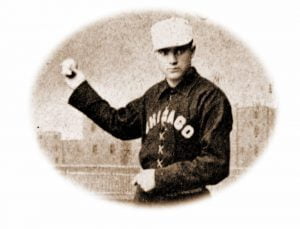
Image Credit: Old Judge Cigarettes, Public domain, via Wikimedia Commons
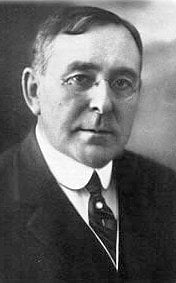
John Wilbur Chapman (Image Credit: Contemporary photograph, Public domain, via Wikimedia Commons)
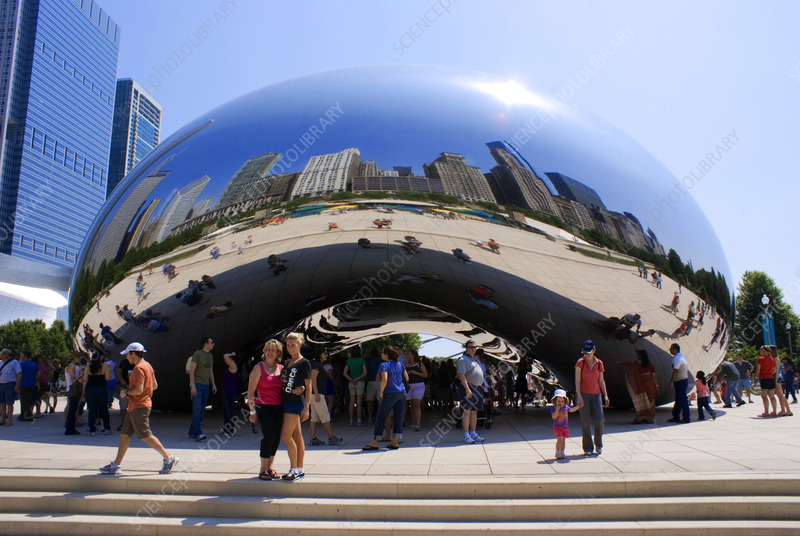
Image Credit MARK WILLIAMSON / SCIENCE PHOTO LIBRARY
Related
Sorry, no records were found. Please adjust your search criteria and try again.
Sorry, unable to load the Maps API.
